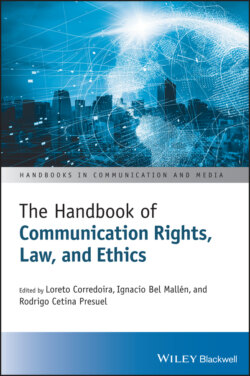Читать книгу The Handbook of Communication Rights, Law, and Ethics - Группа авторов - Страница 27
Egalitarian Dignity
ОглавлениеIn premodern tradition, full dignity was still reserved for those who deserved it. In fact, the concept survived without any significant conflict in a highly hierarchal society in which there were different dignities and abundant discrimination. But, as I have already suggested, the concept bore within itself the seeds of its own improvement. Sure enough, the twentieth century brought about a mutation of its essence, which did not occur, as usually happens, through the influence of the teachings of a renowned philosopher or of a prestigious school of thought inspiring a program of political action; it occurred, in the absence of the learned, through ordinary people and the force of events.
This mutation of essence implied, in the first place, the substitution of the old distinction of aristocracy and an extension to include all the members of the human race – something in the nature of an aristocracy of the masses. All people, for the sole reason that they belong to the human race, possess it equally and forever. Furthermore, this egalitarian dignity is now perceived as self-grounded, not depending on another authority that acts as its foundation (reason, freedom, morality); full from the outset and not needing any later improvement, nor subject to loss, wastage, or depletion through possible misuse by the bearer; absolute and not relative to others, men or animals; and finally centered, not on the duties that it imposes on the bearer, but on his right to demand it be universally respected by others – all of which prepare the ground for the doctrine of universal rights.
Democratic dignity is received at birth and entitles the bearer to rights without any moral virtue on his part, rights that are valid even if the original dignity is belied by the odious indignity of a subject’s life.
Dignity is inalienable, indefeasible, and inviolable; though it is undeserved, it is nonetheless worthy of respect and, in a certain way, places the rest of humanity in a position of owing.
It is unique, universal, anonymous, and abstract. And, consequently, it is also cosmopolitan; in other words, it is the same for all human beings on the planet.
An idea such as this, in spite of appearing to be a truism, is neither “natural” nor “normal,” which is demonstrated by the fact that no one seems to have missed it in the course of previous millennia. It has to be understood rather as if it were an exceedingly difficult lesson to be learned collectively, a lesson that is not written in a revealed book or in the book of nature. It is, as it were, a moral truth that has recently established itself with the majority as a result of recent historic events of unspeakable inhumanity, which have created a consensus, in negative terms, that such events should never, under any circumstances, be repeated.
Something that is evident is perceived, as such, by those whose senses are trained to perceive it – which is what happens in the perception of artistic perfection or philosophical or scientific truth. Therefore, the reason for people’s dignity depends on their education. Kant’s distinction between dignity and price is again useful to encapsulate the multiple objectives of education into two: training professionals and training citizens.
A professional is a person who has learned the rules of a trade and applies them with competence in order to make a living by supplying a product or a service for which the market is prepared to pay a price. A country with competent professionals has the stamp of a truly modern country. Together, with the training of professionals, the second objective is to educate that same individual to become a citizen, which means someone who is aware of their dignity. A rounded education not only becomes the source of practical and profitable skills but also prompts the citizen to be aware of their own dignity and instills self-respect into themselves, to avoid what Kant describes as “to find himself, on self-examination, worthless and contemptible in his own eyes” (Kant 1898, p. 259).
The ancients, at the times when they were not engaged in negotium, recommended the cultivation of otium cum dignitate, a complacency in that intimate feeling about the value of each individual, subject neither to price nor the rationality of the marketplace. Price and dignity are not locked in irreconcilable antagonism, but there is certainly a tension between them, which has no definitive solution. And, if there is a conflict, dignity prevails, because, both in chronologic and anthropologic terms, we are citizens first and professionals second.
